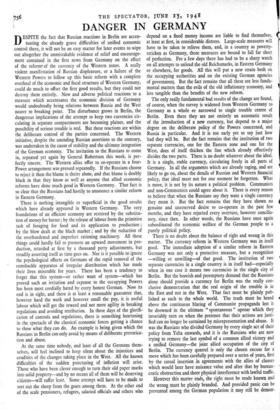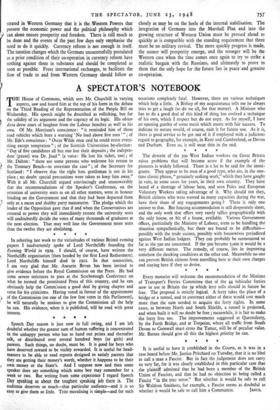DANGER IN GERMANY
DESPITE the fact that Russian reactions in Berlin are accen- tuating the already grave difficulties of unified economic control there, it will not be an easy matter for later events to wipe out altogether the unmistakable evidence of relief and encourage- ment contained in the first news from Germany on the effect of the reform• of the currency of the .Western zones. A really violent manifestation of Russian displeasure, or a failure of the Western Powers to follow up this basic reform with a complete overhaul of the economic and fiscal structure of Western Germany, could do much to offset the first good results, but they could not destroy them entirely. New and adverse political reactions to a measure which accentuates the economic division of Germany would undoubtedly bring relations between Russia and the West nearer to breaking point. The disturbance grows in Berlin, the dangerous implications of the attempt to keep two currencies cir- culating in separate compartments are becoming plainer, and the possibility of serious trouble is real. But these reactions are within the deliberate control of the parties concerned. The Western initiative, despite the unending Russian assertions to the contrary, was undertaken in the cause of stability and the ultimate integration of the German economy. The invitation to the Russians to come in, repeated yet again by General Robertson this week, is per- fectly sincere. The Western allies offer to co-operate in a four- Power arrangement was pressed repeatedly. If the Russians choose to reject it then the blame is theirs alone, and that blame is doubly black in that they know as well as anyone that allied economic reforms have done much good in Western Germany. That fact is so clear that the Russians had hastily to announce a similar reform in Eastern Germany.
There is nothing intangible or superficial in the good results which have already appeared in Western Germany. The very foundations of an efficient economy are restored by the substitu- tion of money for barter ; by the release of labour from the primitive task of foraging for food and its application to production ; by the blow dealt at the black market ; and by the reduction of the overburdened and imperfect rationing machinery. All these things could hardly fail to promote an upward movement in pro- duction, retarded at first by a thousand petty adjustments, but steadily asserting itself as time goes on. Nor is it possible to ignore the psychological effects on Germans of the rapid removal of the ramshackle apparatus of irregular distribution which has made their lives miserable for years. There has been a tendency to forget that this system—or rather want of system—which has proved such an irritation and expense to the occupying Powers has been most cordially hated by every honest German. Now its end is in sight, and there is at least a reasonable guarantee that, however hard the work and however small the pay, it is useful labour which will get the reward and not mere agility in breaking regulations and avoiding retribution. In these days of the glorifi- cation of controls and regulations, there is something heartening in the spectacle of the classical economic forces getting 'a chance to show what they can do. An example is being given which the Russians in Berlin can only avoid by means of deliberate prevarica- tion and abuse.
At the same time nobody, and least of all the Germans them- selves, will feel inclined to keep silent about the injustices and crudities of the changes taking place in the West. All the known difficulties of the sudden puncturing of inflation will arise. Those who have been clever enough to turn their old paper marks into solid property—and by no means all of them will be deserving citizens—will suffer least. Some attempt will have to be made to sort out the sheep from the goats among them. At the other end of the scale pensioners, refugees, salaried officials and others who depend on a fixed money income are liable to find themselves, at least at first, in considerable distress. Large-scale measures will have to be taken to relieve them, and, in a country as poverty- stricken as Germany, those measures are bound to fall far short of perfection. For a few days there has had to be a sharp watch on all attempts to unload the old Reichsmarks, in Eastern Germany or elsewhere, for goods. All this will put a new strain both on the occupying authorities and on the existing German agencies of government. But the fact remains that all these are less funda- mental matters than the evils of the old inflationary economy, and less tangible than the benefits of the new reform.
The only really fundamental bad results of the change are found, of course, when the survey is widened from Western Germany to Germany as a whole or narrowed to single trouble centre of Berlin. Even there they are not entirely an automatic result of the introduction of a new currency, but depend to a major degree on the deliberate policy of the Powers concerned, and Russia in particular. And it is too early yet to say just how bad they will be. But the fact remains that the institution of two separate currencies, one for the Eastern zone and one for the West, does of itself thicken the line which already effectively divides the two parts. There is no doubt whatever about the ideal. It is a single, stable currency, circulating freely in all parts of Germany. In all the arguments which are already raging, and are likely to go on, about the details of Russian and Western financial policy, that ideal must not for one moment be forgotten. What is more, it is not by its nature a political problem. Communists and non-Communists could agree about it. There is every reason to believe that when the Russians say they want a single currency they mean it. But the fact remains that they have shown no genuine and unreserved desire to co-operate in the past few months, and they have rejected every overture, however concilia- tory, since then. In other words, the Russians have once again subordinated the economic welfare of the German people to a purely political policy.
There is no doubt about the balance of right and wrong in this matter. The currency reform in Western Germany was in itself good. The immediate adoption of a similar reform in Eastern Germany was not only a protective measure, but a recognition —willing or unwilling—of that good. The institution of two separate currencies in a single country is in itself bad—especially when in one case it means two currencies in the single city of Berlin. But the boorish and peremptory demand that the Russians alone should provide a currency for Berlin was the really con- clusive demonstration that the real origin of the trouble is in the East and not in the West. That fact must be plainly pub- lished as such to the whole world. The truth must be heard above the continuous blaring of Communist propaganda lest it be drowned in the ultimate " spontaneous " uproar which they invariably turn on when the pretence that their actions are justi- fied can no longer be sustained by misrepresentation and abuse. It was the Russians who divided Germany by every single act of their policy from Yalta onwards, and it is the Russians who are now trying to remove the last symbol of a common allied victory and a unified Germany—the joint allied occupation of the city of Berlin. The currency quarrel is only the chosen excuse for a move which has been carefully prepared over a series of years, first by the casual insertion in agreements with the allies of clauses which would later have nuisance value and after that by bureau- cratic obstruction and sheer physical interference with lawful traffic.
However this matter ends, the right must be made known and the wrong must be plainly branded. And provided panic can be prevented among the German population it may still be demon- strated in Western Germany that it is the Western Powers that possess the economic power and the political philosophy which can alone ensure prosperity and freedom. There is still much to be done and the events of the past few days only emphasise the need to do it quickly. Currency reform is not enough in itself. The taxation changes which the Germans unsuccessfully postulated as a prior condition of their co-operation in currency reform have nothing against them in substance and should be completed as soon as possible. Freer international exchanges, to facilitate the flow of trade to and from Western Germany should follow as closely as may be on the heels of the internal stabilisation. The integration of Germany into the Marshall Plan and into the growing structure of Western Union must be pressed ahead as quickly as is compatible with the standing requirement that there must be no military revival. The more quickly progress is made, the sooner will prosperity emerge, and the stronger will be the Western case when the time comes once again to try to strike a realistic bargain with the Russians, and ultimately to prove to them that the only hope for the future lies in peace and genuine co-operation.































 Previous page
Previous page